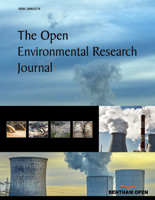- Home
- About Journals
-
Information for Authors/ReviewersEditorial Policies
Publication Fee
Publication Cycle - Process Flowchart
Online Manuscript Submission and Tracking System
Publishing Ethics and Rectitude
Authorship
Author Benefits
Reviewer Guidelines
Guest Editor Guidelines
Peer Review Workflow
Quick Track Option
Copyediting Services
Bentham Open Membership
Bentham Open Advisory Board
Archiving Policies
Fabricating and Stating False Information
Post Publication Discussions and Corrections
Editorial Management
Advertise With Us
Funding Agencies
Rate List
Kudos
General FAQs
Special Fee Waivers and Discounts
- Contact
- Help
- About Us
- Search

The Open Environmental Research Journal
Formerly: The Open Ecology Journal
ISSN: 2590-2776 ― Volume 16, 2023
- New Journal Website
- Journal Home
- Editorial Board
- Board Recruitment Workflow
- Instructions for Authors
- Plagiarism Prevention
- Fabricating and Stating False Information
- Research Misconduct
- Post Publication Discussions and Corrections
- Allegations from Whistleblowers
- Advertising Policy
- Short Guide
- Editorial Policies
- Publishing Ethics and Rectitude
- Quick Track Option
- Reviewer Guidelines
- Guidelines for Guest Editors
- Publication Fee
- Publication Cycle - Process Flowchart
- Archiving Policies
- Special Issues
Effectiveness of Protected Areas in Conserving the Highly Hunted Mammal Species as Bushmeat in Southern Benin
Chabi A.M.S. Djagoun1, 3, *, Etotépé A. Sogbohossou1, Barthélémy Kassa1, Christian B. Ahouandjinou2, Hugues A. Akpona1, Brice Sinsin1
Abstract
Background:
The habitat degradation together with fragmentation and illegal hunting represent a major threat for biodiversity conservation in Lama protected areas.
Method:
We used a combination of questionnaire survey with local communities for ranking the hunted mammal species as bushmeat and track surveys in gridded-cell system of 500x500 m2 (n=268) to assess at what extend the management design, the anthropogenic factors and habitat type affect the occupancy model of those mammal species.
Results:
Twenty mammal species have been predominantly reported by the local inhabitants to consume bushmeat species and 5 of them have been identified as the most preferable as hunted game mammals. The selection of the preferred habitat among the swampy forest, the dense forest, the tree plantations and cropland for the prioritized game species varies between species but looks similar when grouping in different orders. Some bushmeat species were found to select the more secure habitat (natural forest); suggesting the zoning system in the Lama forest can passively protect those species. However, some species such as T. swinderianus although highly hunted showed preference to anthropogenic habitat, avoiding the well secured core zone in Lama Forest.
Conclusion:
Our findings highlighted the importance of the zoning system with different management objectives in the habitat occupancy model of the highly hunted wildlife species.
Article Information

Identifiers and Pagination:
Year: 2018Volume: 11
First Page: 14
Last Page: 24
Publisher Id: TOECOLJ-11-14
DOI: 10.2174/1874213001811010014
Article History:
Received Date: 09/10/2017Revision Received Date: 28/01/2018
Acceptance Date: 07/02/2018
Electronic publication date: 07/03/2018
Collection year: 2018
open-access license: This is an open access article distributed under the terms of the Creative Commons Attribution 4.0 International Public License (CC-BY 4.0), a copy of which is available at: https://creativecommons.org/licenses/by/4.0/legalcode. This license permits unrestricted use, distribution, and reproduction in any medium, provided the original author and source are credited.
* Address correspondence to this author at the Laboratory of Applied Ecology, Faculty of Agronomic Sciences, University of Abomey-calavi, 01BP526 LEA-FSA, Cotonou, Benin; Tel: +22920303084; Email: dchabi@gmail.com
| Open Peer Review Details | |||
|---|---|---|---|
| Manuscript submitted on 09-10-2017 |
Original Manuscript | Effectiveness of Protected Areas in Conserving the Highly Hunted Mammal Species as Bushmeat in Southern Benin | |



